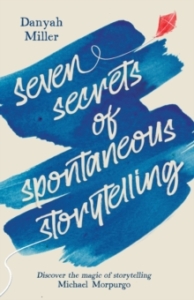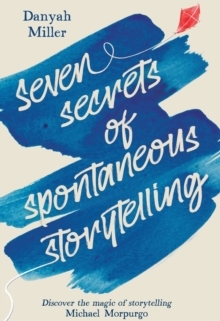Imagination is like a muscle by Danyah Miller
We have a brilliant guest post from storyteller Danyah Miller all about stretching your imagination!

IMAGINATION IS LIKE A MUSCLE….
….and like any muscle it needs exercise. Just as our limbs weaken when we don’t use them, so it is with our imagination.
Storytelling starts with the imagination. I know from my experience that oral storytelling underpins and sits alongside reading and writing, strengthening creativity and inspiring a lifelong love of stories whether in books, comics, through music, film or the visual arts. Oral stories can be a powerful ally when we’re working with neurodivergent or other children who might find reading and writing a struggle.
An active and healthy imagination is crucial to everyone at every age, enabling us to think outside the box and to live to our fullest potential. This inventiveness supports literacy and learning; problem solving; articulation of ideas; reasoning and debating; writing short stories, novels or business plans; engendering empathy; connecting us with others.
Scientists and artists alike need active, rich imaginative forces to do their work well.
We know that young children have abundant imaginations. It is those who are given the time, space and permission to play and explore in an unhurried, unguided way who will continue to develop this innate ability. If, however, we starve the imagination by putting children under constant time pressures and filling their time with activities, we rob them of a precious gift. In our stressed, busy world it’s easy to overlook how important it is for children to slow down and sometimes be a little bored. I urge you not to ‘save’ children from boredom – this could be the storm required before creativity begins to rise.
Nothing repairs our imagination quicker than daydreaming, without a deadline or timetable. Why not ‘unplug’ yourself for a day, and see how resourceful you become.
Reading can be one of the most restful of activities, losing ourselves in other worlds. When we support young children who have not yet mastered the art of reading, by sharing oral stories, making up stories with them, we can open a space for wonder, to which they’ll have access throughout their lives.
I believe that by giving your imagination a regular workout it will repay you and your family generously for many years to come.
Here are three of my suggestions to stretch your imagination
1. Imagination Game: In pairs. Player One takes 3 minutes to describe a ‘character’ (not an existing one from a book, film, video game) What they look like; what shape or size; what they’re wearing; what their face, hands, hair, feet look like. Finally Player One names their character. Now switch. Player Two describes and names their character. When you’ve finished you could draw (or write about) your character.
2. Sense of Hearing: Choose two pieces of music (without words) that you don’t know well. Ask all Players to lie, comfortably, on the floor with their eyes closed. Play an extract from the first piece of music asking them to imagine what they see, hear, smell. After the music finishes let them lie still for another minute. Repeat with the second piece of music. Now hear the descriptions of what they imagined. Use these images to make up a story together, perhaps using the characters from the game above.
3. Memory Game: Word Bag – Give each Player three small pieces of paper onto which they write a word on each (eg: beach; tree; train; holiday; park; football). Add all the words into the bag. First Player pulls out one word and shares a short memory with everyone. Remember to paint a vivid picture for the Listener, using all the senses and your imagination. Your story has begun.
Seven Secrets of Spontaneous Storytelling by Danyah Miller, with foreword by Michael Morpurgo, is out now, published by Hawthorn Press.




